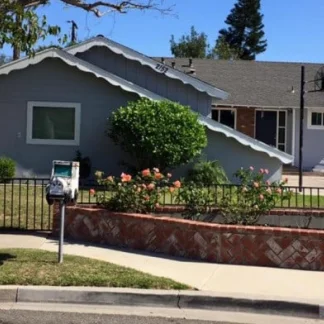Hotel California by the Sea
Hotel California by the Sea - 17th Street is dedicated to provide outpatient ser...
Keystone Sober Living - Keystone 1 is a substance abuse sober living facility in Costa Mesa, California, near Fairview Park. The program aims to give clients a safe and secure community to help them navigate recovery. They serve adult men.
Keystone Sober Living is a structured environment that combines traditional recovery groups, professional services, and a high degree of comfort into a single program. Sober living houses are typically used as a step down after completing a treatment program.
Sober living facilities help clients who have recently completed treatment by giving them a communal living space shared with others in recovery. These facilities do not allow drug or alcohol use and perform random drug tests to ensure clients remain sober. They differ from inpatient programs in that clients are permitted to come and go as they please.
Keystone Sober Living requires clients to participate in mandatory house meetings in order to remain on the premises. Additionally, the home serves as an introduction to the Alano Club support group. The facility features three shared bedrooms, cable television, central heat, computers, wireless internet, and two kitchens. Residents also have access to professional services.
Before attempting to use insurance for any recovery services, clients are encouraged to confirm coverage with their insurance provider, since in network and out of network benefits can vary.
Contact us for more information: (949) 478-5356

Connect with Keystone Sober Living - Keystone I by calling their admissions team directly.
(949) 478-5356 Website Get DirectionsState Licenses are permits issued by government agencies that allow rehab organizations to conduct business legally within a certain geographical area. Typically, the kind of program a rehab facility offers, along with its physical location, determines which licenses are required to operate legally.
State License: California
Fitness therapy blends exercise with psychotherapy for a fun, inspiring, and effective way of treating addiction and other issues. By incorporating movement into counseling sessions, clients become more empowered, motivated, and goal-oriented, all while strengthening their bodies and becoming more flexible. Fitness Therapy is usually used to complement a course of treatment (inpatient or outpatient) to make it even more successful. Increasing the connection between a patient’s mind and body helps both with healing as well as in creating new, healthy habits.
Group therapy is any therapeutic work that happens in a group (not one-on-one). There are a number of different group therapy modalities, including support groups, experiential therapy, psycho-education, and more. Group therapy involves treatment as well as processing interaction between group members.
Life skills trainings involve all the skills a person must have in order to function successfully in the world. These include time management, career guidance, money management, and effective communication. Truly successful addiction recovery is based on the ability to not only live substance-free, but to thrive. Life skills teaches the practical necessities of functioning in society, which sets clients up for success in life, and therefore sobriety.
Recreational therapy (aka therapeutic recreation) uses creative and fun activities to help with addiction recovery. Recreational therapists lead patients in entertaining and engaging activities like sports or games; art (drawing, painting, sculpture); drama, music, and dance; and/or community outings (field trips) to improve patients' physical, social, and emotional well-being.
Group therapy is any therapeutic work that happens in a group (not one-on-one). There are a number of different group therapy modalities, including support groups, experiential therapy, psycho-education, and more. Group therapy involves treatment as well as processing interaction between group members.
Life skills trainings involve all the skills a person must have in order to function successfully in the world. These include time management, career guidance, money management, and effective communication. Truly successful addiction recovery is based on the ability to not only live substance-free, but to thrive. Life skills teaches the practical necessities of functioning in society, which sets clients up for success in life, and therefore sobriety.
Recreational therapy (aka therapeutic recreation) uses creative and fun activities to help with addiction recovery. Recreational therapists lead patients in entertaining and engaging activities like sports or games; art (drawing, painting, sculpture); drama, music, and dance; and/or community outings (field trips) to improve patients' physical, social, and emotional well-being.
Life skills trainings involve all the skills a person must have in order to function successfully in the world. These include time management, career guidance, money management, and effective communication. Truly successful addiction recovery is based on the ability to not only live substance-free, but to thrive. Life skills teaches the practical necessities of functioning in society, which sets clients up for success in life, and therefore sobriety.
Recreational therapy (aka therapeutic recreation) uses creative and fun activities to help with addiction recovery. Recreational therapists lead patients in entertaining and engaging activities like sports or games; art (drawing, painting, sculpture); drama, music, and dance; and/or community outings (field trips) to improve patients' physical, social, and emotional well-being.
Recreational therapy (aka therapeutic recreation) uses creative and fun activities to help with addiction recovery. Recreational therapists lead patients in entertaining and engaging activities like sports or games; art (drawing, painting, sculpture); drama, music, and dance; and/or community outings (field trips) to improve patients' physical, social, and emotional well-being.
Hotel California by the Sea - 17th Street is dedicated to provide outpatient ser...
Yellowstone Recovery is a nonprofit drug and alcohol addiction recovery center i...
Nancy Clark and Associates, located in Newport Beach, California, offers justice...
National Treatment Centers is a private rehab located in Newport Beach, Californ...